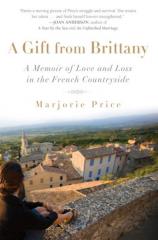Reading Group Guide
Discussion Questions
A Gift from Brittany

1. It was unusual for a young woman to travel alone in 1960. Midge hardly spoke French, knew no one, and encountered strong opposition from her family and fiancé. Yet she was determined to go to France to paint. Was she was courageous to do so? Or was she was reckless and foolish? Would you have gone off to a foreign country as she did?
2. Midge acquiesces when Yves purchases half of a hamlet without consulting her, even though she makes it clear that La Salle is far from what she expected and expresses her aversion to the place. Should she have been more forceful? Should she have recognized Yves’ authoritarianism as a warning of things to come?
3. Discuss Midge’s expectations versus the reality of what she found in marrying a French artist and in the acquiring of a country home.
4. Discuss the conflict of cultures between Chicago and Paris; urban and rural; twentieth and nineteenth centuries.
5. What do Midge and Jeanne have in common? How important to friendship is common experience? Common language? Common interests? Common culture? How are Midge and Jeanne able to relate to each other in spite of their differences?
6. How does Midge’s friendship with Jeanne sustain her when her marriage becomes troubled? What does the quatre quarts cake symbolize in their friendship? Midge takes Jeanne to the beach, which she has never seen before. What is the significance of the experience to Jeanne? To Midge?
7. What do Midge and Yves have in common? How important to a marriage is common experience? Common language? Common interests? Common culture? Do specific problems arise between Midge and Yves that might not occur otherwise because they come from different nationalities and backgrounds? Does the global interconnectedness of recent times make it easier for marriages to reach across borders?
8. How important is the fact that Midge and Yves are both artists to the success or failure of their marriage? Why is Yves resentful of the school teacher’s and his wife’s reaction to Midge’s watercolors? Why is he enraged when the Irish poet, Barnet Conlan, invites Midge to join him on his visits to art galleries? Should Midge have avoided these confrontations?
9. Midge continues to paint in secret, even in the face of Yves’ insistence that she stop painting entirely. How do the difficulties in Midge’s and Yves’ marriage affect her development as an artist? Was she wrong to hide her paints and canvasses? Do you think the marriage would have had a better chance if Midge had obeyed Yves’ interdiction to paint?
10. In what way do you think the experience of living in a remote country village, surrounded by a pine forest, affected Midge’s painting? How do you think her artistic development might have been different if she had remained in Paris? In Chicago? Cite specific descriptive passages of people, landscapes, farm scenes, and seascapes that may have been informed by the sensibility of an author who was a lifelong painter.
11. What hardships does Midge have to overcome when she returns to La Salle in the middle of winter without Yves? How do Jeanne and Marcel come to her aid? How does their support and affection help her to rise to challenges she never expected to face in life?
12. What is the significance of David in Midge’s life? In Danielle’s life? In Jeanne’s life? Does Midge overreact to his neglect of La Salle during her absence? Should she have blamed Mosca, rather than David? Why is Danielle traumatized by his banishment from La Salle?
13. Midge experiences an epiphany on the cliffs of the Côte Sauvage, the “Wild Coast.” What insight does she have? Why do you think it occurs in that particular place? What is the essence of the understanding that enables her to paint again?
14. Jeanne’s family thinks she is “a burden” at the end of her life. What cultural assumptions underlie that attitude? Are they specific to Brittany? Midge is dismayed because she feels she has let Jeanne down at the end of her life. How has she let her down? Could she have done otherwise?
15. What does the title of the book, A Gift from Brittany, evoke in your mind? What is the “gift”? Is it the opportunity for Midge to live in France and fulfill her artistic aspirations? Is it the friendship with Jeanne? The coif? Is it Midge’s learning to find resilience in adversity? Is it the kinship made with a new land and a new culture?
16. Love and loss in the French countryside is the subtitle of the book. How do you interpret the “loss”? Is it the loss of trust, of marriage? Is it the loss of loved ones, such as a husband or a friend? The loss of La Salle? The loss of a way of life? Not only are there emotional losses, but also physical and material losses. What impact do the losses have on Midge’s life?
17. What does the word love refer to in the subtitle? Midge’s love for a new land, a new culture? The love of a child, a husband, a friend? The love of sharing new adventures with Jeanne? The love of a strong, unconditional bond with Jeanne? The love of finding inner strengths, of finally being able to control one’s own life?
18. Compare and contrast the events and characters of this book with your own life. Have you ever found yourself in a place completely different from all that is familiar? Have you ever been close to someone with whom you had nothing in common? Is there a universal theme in the memoir that the reader can apply to his/her own life? What enduring qualities does the memoir possess for the reader?
A Gift from Brittany
- Publication Date: March 3, 2009
- Paperback: 272 pages
- Publisher: Gotham
- ISBN-10: 1592404340
- ISBN-13: 9781592404346







